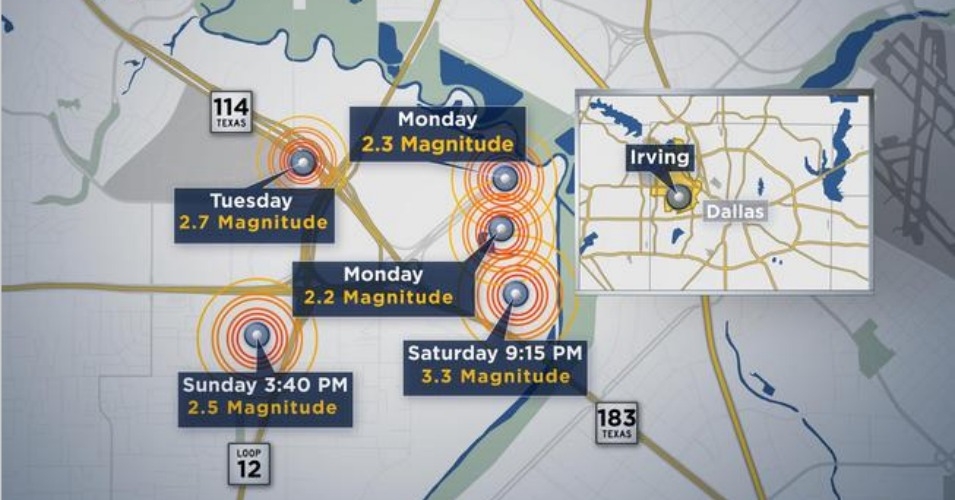Five Earthquakes in Four Days: Is Spate of Texas Earthquakes Connected to Nearby Fracking Operations?

The city of Irving, Texas has experienced five earthquakes in four days, leading some critics to blame increased seismic activity on nearby fracking operations.
The first earthquake, Saturday night, was a magnitude 3.3 quake that was felt by hundreds of North Texans. A 2.5-magnitude quake hit on Sunday, followed by two more on Monday, magnitudes 2.2 and 2.3. And a fifth 2.7-magnitude earthquake was reported Tuesday evening just east of the University of Dallas campus.
Residents and city leaders point to area oil and gas disposal wells, where fracking wastewater is injected deep underground, as likely culprits. There is a wastewater disposal well near the epicenter of Saturday’s quake.
“We are guinea pigs in the middle of this fracking experiment. Texas homes are built to withstand wind, not earthquakes,” Sharon Wilson, an organizer for the advocacy group Earthworks, told Reuters. “Who will pay for the damage to private property?”
Luke Metzger, director of Environment Texas, agreed: “People are scared,” he told Newsradio 1200 WOAI. “They are not used to waking up to find their homes shaking. The connection between fracking and earthquakes is obvious.”
A map of this week’s earthquakes. (Credit: NBC Dallas-Fort Worth)
A study published last month backs up such claims. Looking at data from National Science Foundation seismographs located near fracking sites, scientists in Ohio were able to make direct connections between at least 400 small “micro-earthquakes” and nearby fracking operations in that state.
Earlier this year, U.S. Geological Survey and the Oklahoma Geological Survey stated that wastewater injection was “a likely contributing factor to the increase in earthquakes” in Oklahoma. “This phenomenon is known as injection-induced seismicity, which has been documented for nearly half a century, with new cases identified recently in Arkansas, Ohio, Texas and Colorado.”
WOAI reports that “[t]he Texas Oil and Gas Association says it is open to an investigation into the connection between hydraulic fracking and earthquakes which have become more common in Texas since the widespread practice of shale fracking began in 2009.”
“The oil and natural gas industry agrees that recent seismic activity warrants robust investigation to determine the precise location, impact, and cause or causes of seismic events,” Todd Staples, president of the Texas Oil and Gas Association, told the station.
Irving is located just 35 miles from Denton, Texas, where residents recently voted to ban fracking within city limits. In the days after the vote, the Texas Oil and Gas Association filed an injunction to prevent the ban from being instated; the Texas General Land Office filed a separate lawsuit to block the new rule; and a local regulator said she would not enforce the ban.


